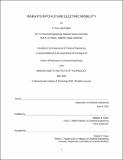Insights into future electric mobility
Author(s)
Hsieh, I-Yun Lisa.
Download1197076130-MIT.pdf (8.228Mb)
Other Contributors
Massachusetts Institute of Technology. Department of Chemical Engineering.
Advisor
William H. Green.
Terms of use
Metadata
Show full item recordAbstract
Growing global awareness of the environmental impacts of combustion is accelerating electric vehicles (EVs) adoption. However, future sustainable mobility cannot be achieved without substantial changes in vehicle technology, consumer behavior, infrastructure systems, and policy. Great impacts and uncertainties are anticipated during the transition towards electric mobility. This thesis examines key areas of interest such as battery techno-economic characteristics, EV recharging ecosystem, dynamics behind the market evolution, the prospects and challenges for the transition to electrification, and the impacts of evolving EV policies. For example, given that the battery prices have been dropping rapidly in the past several years, a recurring question is how much lower battery prices can be expected to go. Greater production volumes and improvements in manufacturing efficiency will drive down costs, but the prices will eventually stabilize as they get closer to the cost of the materials they are made of. A 2-stage learning curve model is developed to investigate how the essential materials, especially expensive elements (lithium, nickel and cobalt) used in current battery technologies, will constrain the declining trajectory of production costs and set practical lower bounds on battery prices. Another big uncertainty surrounding EVs is whether they could really create a cleaner planet. EVs avoid tailpipe emissions of CO2 and air pollutants from fossil fuel combustion but may lead to greater emissions from the upstream stage of electricity generation, especially in the world's largest EV market, China, where coal-fired power generation has been the backbone of the electricity supply. The current lifecycle emissions comparison for vehicles with different powertrains is presented and how China's sustainable mobility policy will affect future climate change, air quality, and public health is also explored. This thesis provides information that will help stakeholders anticipate and navigate some of the changes that lie ahead owing to a policy-driven shift from liquid fuels to electrification. The evaluation focuses mostly on private passenger vehicle sector, which in part reflects a recognition that this is the segment that is likely to be responding most proactively to the developments in advanced powertrains, alternative fuels, and environmental policies.
Description
Thesis: Ph. D., Massachusetts Institute of Technology, Department of Chemical Engineering, May, 2020 Cataloged from the official PDF of thesis. Includes bibliographical references (pages 218-239).
Date issued
2020Department
Massachusetts Institute of Technology. Department of Chemical EngineeringPublisher
Massachusetts Institute of Technology
Keywords
Chemical Engineering.